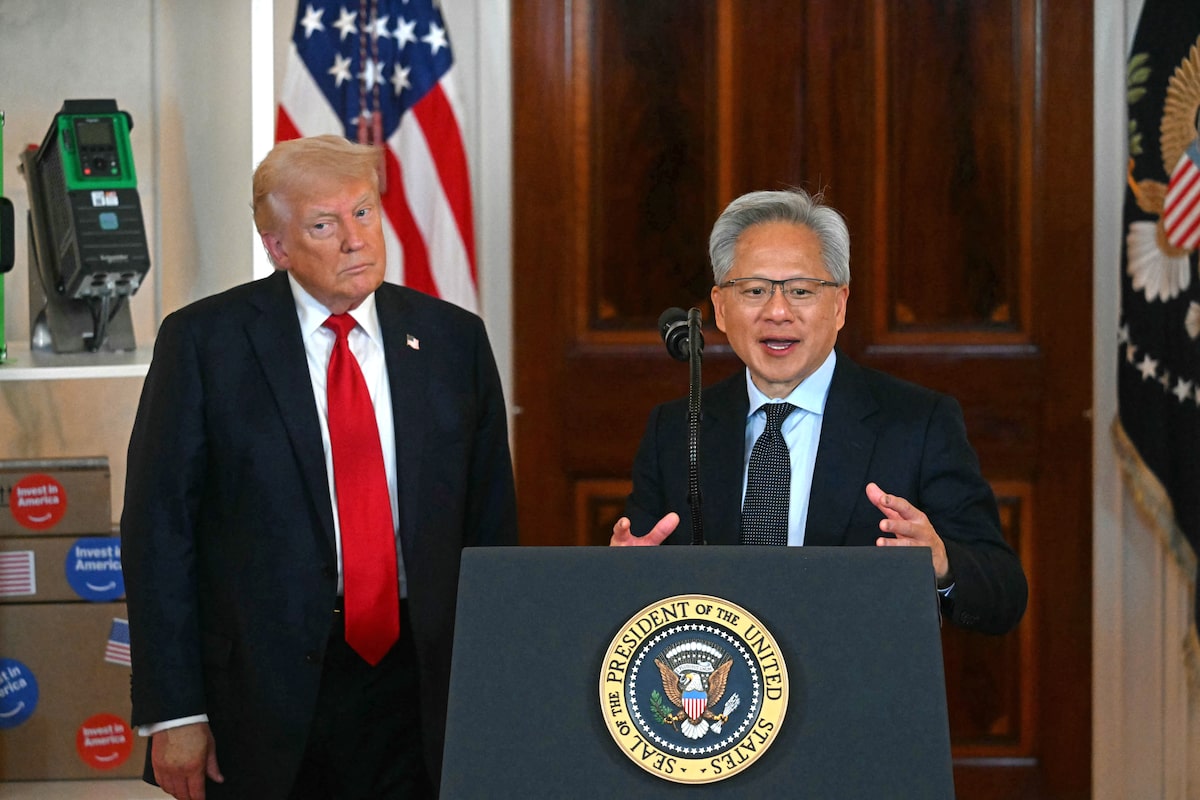Nvidia CEO Jensen Huang and U.S. President Donald Trump at the White House in April. Many Big Tech behemoths who previously pledged to ban AI for military use are now fully on board with the Trump approach.JIM WATSON/AFP/Getty Images
Because of revelations about his cognitive decline, a dark shadow has been cast over Joe Biden’s time as president. His work, so much of it good compared to that of his successor, is undeservedly discredited.
The AI revolution is an example. The Biden administration put up guardrails on AI via its 2023 executive order. It was aimed at ensuring the safe, secure and trustworthy development of AI.
Mr. Biden conferred with the Chinese on the dangers associated with artificial intelligence, such as the advent of killer robots – no longer science fiction – and the potential capacity of AI systems to independently launch a nuclear strike. There was at least some hope of co-operation.
What a washout the Biden effort has turned out to be. In the first days of his second term, Donald Trump revoked the Democrat’s executive order and threw away the safeguards. He brought in an AI action plan that gives Big Tech carte blanche to bring on AI technologies at warp speed, regardless of the consequences.
“The AI future is not going to be won by hand-wringing about safety,” Vice-President JD Vance declared. As if to say that AI-styled weapons of mass destruction that can be used without adequate human supervision are not a worry. What’s the big deal?
BenchSci cuts 23% of jobs, becoming latest company to replace humans with AI
Opinion: Once an AI world leader, Canada is now losing the AI startup race
Far from any co-operation on controlling military AI, the U.S. and China are now on a collision course, locked into a new global AI arms race.
Big Tech behemoths like Meta, Google and OpenAI, which previously pledged to ban AI for military use, have reneged on such vows and are now fully on board with the Trump approach.
Danger signals go unheeded. A recent headline about a famed Canadian filmmaker said: “James Cameron Warns ‘A Terminator-Style Apocalypse’ Could Happen with Military Application of AI for Weapons Systems.”
Senator Ted Cruz recently asked robot-producer Elon Musk about the prospect of killer robots annihilating humanity. “Twenty per cent likely,” Mr. Musk responded. “Maybe 10 per cent,” adding that it could happen in “five to 10 years.” He wasn’t asked about the prospects of AI resulting in something more modest, such as partial annihilation.
United Nations Secretary-General António Guterres recently called for a global ban on lethal autonomous weapon systems. His words were wise. “We cannot delegate life-or-death decisions to machines.”
But despite the warnings, and despite pledges such as one in Seoul last September where 61 countries made a commitment to retain human control over autonomous weapons systems, hopes are dim. Forces vying for strong regulation of the military application of AI have been swept aside by a wave of Mr. Trump’s hand. He’s winning the debate by a landslide.
The onset of AI’s existential threat is meeting even less resistance than Mr. Trump’s undoing of Joe Biden’s effort to counter the other doomsday threat: the climate crisis.
In other sectors of the economy, the rush into AI might be slowed by the toll it takes on jobs. Many economists predict heavy losses within a couple of years. But in the military realm, no such pressure can be anticipated – not with superiority over China at stake.
Canada has a good history in championing disarmament; its work leading to the treaty banning anti-personnel land mines is a fine example. But on the dangers of the AI arms race, there is relative silence. In 2019, a mandate letter from then prime minister Justin Trudeau instructed then foreign minister François-Philippe Champagne to “advance international efforts to ban the development and use of fully autonomous weapons systems.” Nothing much has come of it. Instead what is prioritized is how Canada is doing in the AI startup race and how it is being held back by a lack of funding.
That is a legitimate concern. But there is nowhere near enough debate on the subject of machine supremacy; of AI being, as Mr. Musk calls it, “the most disruptive force in history”; of humanity’s turning point, wherein for the first time, a force is being created that is more intelligent than we are.
Mr. Musk is predicting 10 billion humanoid robots by 2040. He is no stranger to exaggeration. But even if it’s just a small fraction of that number, it’s an indication of the mammoth changes in store.
The Carney government has created a new position of minister of artificial intelligence, and named former journalist Evan Solomon to the job. He faces as important and as daunting a task as any minister. He should be sounding more alarm bells because what is happening is not hyperbole.
The genie is out of the bottle.

